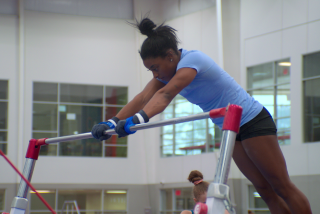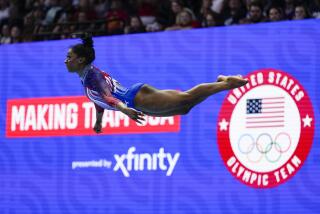TENNIS / WOMEN’S TOURNAMENT AT MANHATTAN BEACH : Seles Is Too Much for Frazier
- Share via
It wasn’t just tennis, it was more like batting practice. Imagine Monica Seles swinging an aluminum bat instead of a graphite racket, knocking baseballs into the gaps in the outfield, and you’ve got a pretty fair idea of how the No. 1 player in the world treats a tennis ball.
On the other side of the net, anxiously patrolling the baseline, Amy Frazier tried to put herself in the same area code as the shots bouncing around her ankles.
And after absorbing a 6-2, 6-0, 46-minute pounding Thursday night in the Virginia Slims of Los Angeles, Frazier offered an equally brief impression of what it feels like to watch tennis balls you can’t reach bounce off the stands behind you. It is the tennis equivalent of whiplash.
Said Frazier: “Obviously, she’s very good at this.”
Well, yes, she is. Seles slapped 19 winners, converted six of eight break-point chances, served four aces--one clocked at 101 m.p.h.--kept Frazier from winning a single point on her second serve and dominated what had shaped up to be a fairly competitive match.
Afterward, Seles was tougher on herself than Frazier had been.
“Definitely, the score was a lot easier than the match was,” Seles said. “I definitely played better (than my first-round match), but I still don’t think I played incredible.”
So what score qualifies as incredible?
“I don’t go by the score, I go by how I feel out there,” Seles said.
Let the record show Seles felt pretty darned good. In fact, when pressed to honestly critique her match, the worst that Seles could find was two games that went to 30-love. And she wound up winning both of those.
Actually, the real reason Seles won so quickly might have been because of her eyesight.
“I wanted to get the match over as soon as possible before the darkness came,” she said. “The last five minutes, I couldn’t even see one or two balls.”
If things get any worse, Seles said she may be forced to get her eyes checked. By then, someone might ask her to do the same thing with her racket.
Pam Shriver, part-time philosopher but still full-time tennis player, lost her second-round match to Zina Garrison, 7-5, 6-2, and reflected on the psyche of her opponent.
“Zina is like a lot of us . . . a little schizophrenic,” Shriver said. “You know, a couple of different personalities in one match.”
Against Shriver, Garrison was enough different people to fill a section of the stands.
Garrison fell behind, 5-2, but won the next five games.
“I felt great the first seven games,” Shriver said. “I felt great the next seven games, too, but what was across the net from me was, whew, pretty good.”
Garrison took a 3-0 lead in the second set, but Shriver cut it to 3-2 and had a game point 3-3 before Garrison pulled away again.
“(Last year), I totally would have taken out the water cooler, flowers, everything else around there,” said Garrison, who found it necessary to get a new attitude after falling from No. 4 to No. 16 in the rankings during the last two years.
At last year’s Virginia Slims of Los Angeles, Garrison lost badly to Jo Durie and considered taking a sabbatical from tennis, which she eventually decided against. But Garrison couldn’t pull out of her professional tailspin.
She says she is largely known for one match--losing to Martina Navratilova in the 1990 Wimbledon final.
“It’s very weird,” said Garrison, who might not have found the particular degree of mellowness she has embraced without the aid of her coach, Willis Thomas.
“But I wouldn’t use the word schizophrenic,” Garrison said. “I know exactly what Pam means, though.”
Tennis Notes
Zina Garrison, who plays Martina Navratilova in the quarterfinals today, is 1-30 against her. . . . Helena Sukova defeated Jo Durie in three sets, then teamed with Arantxa Sanchez Vicario to win a doubles match against Liz Smylie and Robin White. . . . Kim Po, former UCLA player about to become a former pro going back to school, moved into the quarterfinals against Manuela Maleeva-Fragniere when Rosalyn Fairbank-Nideffer retired in the second set because of a sore elbow. . . . Pam Shriver said she is committed to playing a full schedule through 1993 but isn’t sure after that. “I said five years ago that at 30 it would be enough (but) now I’m 30, it’s not enough,” she said. “I feel like I’m a factor--not a major factor, but I’m still in there. I’m a player.”
More to Read
Go beyond the scoreboard
Get the latest on L.A.'s teams in the daily Sports Report newsletter.
You may occasionally receive promotional content from the Los Angeles Times.










